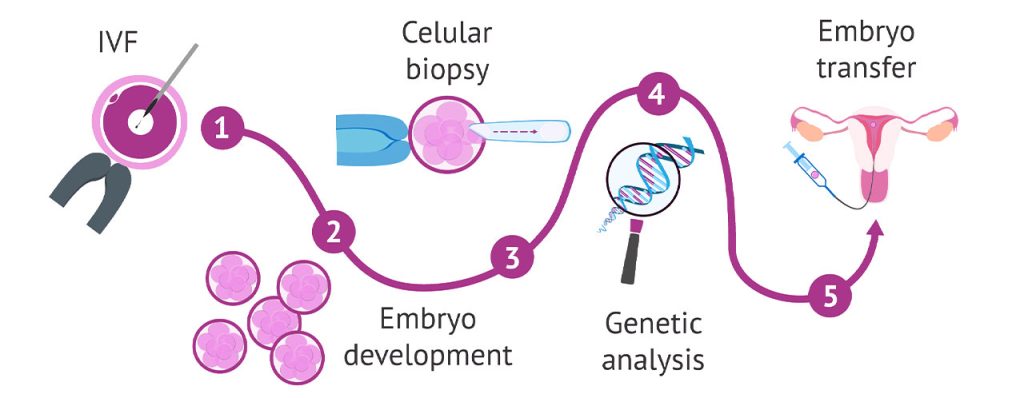What is
In Vitro Fertilization ?
In Vitro Fertilization (IVF) is a fertility treatment that assists couples or individuals in conceiving a child when they face difficulties with natural conception. IVF in Antalya, facilitated by Kaden Health Care, offers high-quality, affordable fertility services for patients seeking assistance with their reproductive journey.
During IVF, mature eggs are retrieved from the woman’s ovaries and fertilized with sperm in a laboratory. The fertilized eggs, now embryos, are then transferred to the woman’s uterus, where they can implant and develop into a pregnancy. IVF has helped many couples overcome infertility issues and achieve successful pregnancies.
Antalya, a popular health tourism destination, is known for its state-of-the-art fertility clinics and experienced fertility specialists. Kaden Health Care, as a leading health tourism agency, plays a vital role in connecting patients with reputable IVF clinics in Antalya, ensuring they receive top-quality care throughout their fertility journey.

Why Is
In Vitro Fertilization Performed?
In Vitro Fertilization is performed to help couples or individuals who face difficulties with natural conception achieve a successful pregnancy. With the assistance of Kaden Health Care, a health tourism agency, and the state-of-the-art fertility clinics in Antalya, patients can access high-quality IVF treatments. There are several reasons why IVF is performed, including:
- Fallopian tube damage or blockage: IVF can be an effective option for women with damaged or blocked fallopian tubes, which can prevent the egg and sperm from meeting naturally.
- Ovulation disorders: Women with irregular or infrequent ovulation may have difficulty conceiving naturally. IVF can help by stimulating the ovaries to produce multiple eggs for fertilization.
- Male factor infertility: IVF can be beneficial for couples dealing with male infertility issues, such as low sperm count or poor sperm motility. IVF, combined with Intracytoplasmic Sperm Injection (ICSI), can increase the chances of successful fertilization.
- Unexplained infertility: In cases where the cause of infertility is unknown, IVF can still be an effective treatment option to help couples conceive.
- Endometriosis: Women with endometriosis may face challenges with fertility due to the growth of endometrial tissue outside the uterus. IVF can bypass these issues and increase the chances of successful conception.
- Genetic disorders: IVF, combined with Preimplantation Genetic Testing (PGT), can help couples with a risk of passing on genetic disorders to their children by screening embryos for specific genetic conditions before implantation.
- Age-related infertility: As women age, their fertility declines. IVF can increase the chances of conception for older women or those with diminished ovarian reserve.
By choosing In Vitro Fertilization in Antalya with the help of Kaden Health Care, patients can access expert care and state-of-the-art fertility treatments designed to help them overcome various fertility challenges and achieve successful pregnancies.

How Do I Prepare for In Vitro Fertilization?
Preparing for In Vitro Fertilization involves several steps to ensure the best possible outcome for the treatment. If you are considering IVF in Antalya, follow these guidelines to help you prepare:
- Consult a fertility specialist: Begin by scheduling a consultation with a fertility specialist who can evaluate your medical history, perform necessary tests, and determine if IVF is the right option for you. They will also provide you with detailed information about the procedure, success rates, and potential risks.
- Pre-treatment tests and screenings: You and your partner may need to undergo several tests and screenings before starting IVF. These can include blood tests, semen analysis, infectious disease screening, uterine cavity exam, and ovarian reserve testing.
- Stop smoking and limit alcohol: Both smoking and excessive alcohol consumption can negatively affect fertility in both men and women. Quitting smoking and reducing alcohol intake can improve your chances of a successful IVF cycle.
- Maintain a healthy lifestyle: Eating a balanced diet, exercising regularly, and managing stress can positively impact your overall health and fertility. Aim to maintain a healthy weight, as being overweight or underweight can affect fertility.
- Start taking prenatal vitamins: Begin taking prenatal vitamins, particularly those containing folic acid, before starting your IVF treatment. Folic acid can help prevent certain birth defects in the baby’s brain and spine.
- Understand the costs: IVF can be expensive, and costs can vary depending on the clinic and the specific treatments required. Make sure you have a clear understanding of the costs involved and explore any financial assistance or insurance coverage options available.
- Prepare emotionally: IVF can be a physically and emotionally demanding process. It’s essential to have a support system in place, whether that includes friends, family, or a support group. Consider seeking the help of a counselor or therapist who specializes in fertility issues to help you navigate the emotional challenges associated with IVF.
By following these guidelines and working closely with your fertility specialist, you can prepare for your IVF journey in Antalya and increase your chances of success.

How Is In
Vitro Fertilization Performed ?
IVF is a complex fertility treatment that involves several stages. When considering IVF in Antalya, with the assistance of Kaden Health Care, patients can expect the following steps in the IVF process:

Throughout the IVF process in Antalya, Kaden Health Care (Health Tourism Agency) can help patients connect with top-quality fertility clinics and ensure they receive the highest level of care and support during their fertility journey.
- Ovarian stimulation: The woman receives hormone injections to stimulate her ovaries to produce multiple mature eggs. This process usually takes 8-14 days and involves regular blood tests and ultrasound monitoring to track the development of the follicles.
- Egg retrieval: Once the eggs are mature, the fertility specialist performs an egg retrieval procedure. This involves using a thin needle, guided by ultrasound, to collect the eggs from the ovaries. The procedure is typically performed under sedation or anesthesia.
- Sperm collection and preparation: On the day of egg retrieval, the male partner provides a semen sample. The sperm is then processed to separate the most motile and healthy sperm for fertilization.
- Fertilization: The collected eggs are combined with the prepared sperm in the laboratory. In some cases, Intracytoplasmic Sperm Injection (ICSI) is used, where a single sperm is injected directly into each egg to promote fertilization. The eggs are then monitored for signs of fertilization and embryo development.
- Embryo culture: Fertilized eggs, now embryos, are cultured in the lab for several days, typically 3-5 days, allowing them to develop to a specific stage before transfer.
- Embryo transfer: The fertility specialist selects the best quality embryos for transfer. Using a thin catheter, the embryos are placed into the woman’s uterus in a minimally invasive procedure. This is usually done under ultrasound guidance and does not require anesthesia.
- Progesterone support: After the embryo transfer, the woman may receive progesterone supplements to support the implantation process and the early stages of pregnancy.
- Pregnancy test: Approximately two weeks after the embryo transfer, the woman takes a blood test to determine if the IVF treatment has resulted in pregnancy.
What Are the Complications Associated with In Vitro Fertilization?
Although In Vitro Fertilization (IVF) has helped many couples achieve successful pregnancies, it is important to be aware of the potential complications associated with the procedure. Some of the risks and complications include:
- Multiple pregnancies: IVF increases the chances of multiple pregnancies (twins, triplets, or more) when more than one embryo is transferred. Multiple pregnancies can lead to a higher risk of pregnancy complications, such as premature birth and low birth weight.
- Ovarian hyperstimulation syndrome (OHSS): In some cases, the medications used to stimulate the ovaries can cause them to become swollen and painful. OHSS is usually mild but can become severe in rare cases, causing rapid weight gain, abdominal pain, and shortness of breath.
- Ectopic pregnancy: Although rare, IVF can result in an ectopic pregnancy, where the fertilized egg implants outside the uterus, typically in a fallopian tube. Ectopic pregnancies are not viable and require immediate medical attention.
- Egg retrieval complications: The egg retrieval procedure carries a small risk of infection, bleeding, or injury to nearby organs. However, serious complications are rare.
- Emotional stress: The IVF process can be emotionally and physically demanding, leading to increased stress, anxiety, and depression in some individuals or couples.
- Birth defects: While the overall risk of birth defects with IVF is low, some studies suggest a slightly higher risk of certain birth defects in IVF-conceived children compared to those conceived naturally. However, the absolute risk remains low.
- Failure to achieve pregnancy: Despite the advancements in IVF technology, not all cycles result in a successful pregnancy. Age, ovarian reserve, and other individual factors can impact the likelihood of success.
It is crucial to discuss the potential risks and complications with your fertility specialist before undergoing IVF. They can provide guidance on minimizing these risks and ensuring that you receive the most appropriate care for your specific situation.





